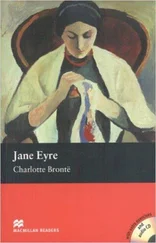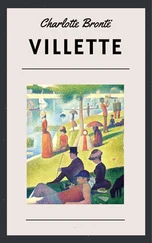He listened very gravely; his face, as I went on, expressed more concern than astonishment; he did not immediately speak when I had concluded.
“Shall I call Mrs. Fairfax?” I asked.
“Mrs. Fairfax? No; what the deuce would you call her for? What can she do? Let her sleep unmolested.”
“Then I will fetch Leah, and wake John and his wife.”
“Not at all: just be still. You have a shawl on. If you are not warm enough, you may take my cloak yonder; wrap it about you, and sit down in the armchair: there, — I will put it on. Now place your feet on the stool, to keep them out of the wet. I am going to leave you a few minutes. I shall take the candle. Remain where you are till I return; be as still as a mouse. I must pay a visit to the second storey. Don’t move, remember, or call any one.”
He went: I watched the light withdraw. He passed up the gallery very softly, unclosed the staircase door with as little noise as possible, shut it after him, and the last ray vanished. I was left in total darkness. I listened for some noise, but heard nothing. A very long time elapsed. I grew weary: it was cold, in spite of the cloak; and then I did not see the use of staying, as I was not to rouse the house. I was on the point of risking Mr. Rochester’s displeasure by disobeying his orders, when the light once more gleamed dimly on the gallery wall, and I heard his unshod feet tread the matting. “I hope it is he,” thought I, “and not something worse.”
He re-entered, pale and very gloomy. “I have found it all out,” said he, setting his candle down on the washstand; “it is as I thought.”
“How, sir?”
He made no reply, but stood with his arms folded, looking on the ground. At the end of a few minutes he inquired in rather a peculiar tone —
“I forget whether you said you saw anything when you opened your chamber door.”
“No, sir, only the candlestick on the ground.”
“But you heard an odd laugh? You have heard that laugh before, I should think, or something like it?”
“Yes, sir: there is a woman who sews here, called Grace Poole, — she laughs in that way. She is a singular person.”
“Just so. Grace Poole — you have guessed it. She is, as you say, singular — very. Well, I shall reflect on the subject. Meantime, I am glad that you are the only person, besides myself, acquainted with the precise details of tonight’s incident. You are no talking fool: say nothing about it. I will account for this state of affairs” (pointing to the bed): “and now return to your own room. I shall do very well on the sofa in the library for the rest of the night. It is near four: — in two hours the servants will be up.”
“Goodnight, then, sir,” said I, departing.
He seemed surprised — very inconsistently so, as he had just told me to go.
“What!” he exclaimed, “are you quitting me already, and in that way?”
“You said I might go, sir.”
“But not without taking leave; not without a word or two of acknowledgment and goodwill: not, in short, in that brief, dry fashion. Why, you have saved my life! — snatched me from a horrible and excruciating death! and you walk past me as if we were mutual strangers! At least shake hands.”
He held out his hand; I gave him mine: he took it first in one, them in both his own.
“You have saved my life: I have a pleasure in owing you so immense a debt. I cannot say more. Nothing else that has being would have been tolerable to me in the character of creditor for such an obligation: but you: it is different; — I feel your benefits no burden, Jane.”
He paused; gazed at me: words almost visible trembled on his lips, — but his voice was checked.
“Goodnight again, sir. There is no debt, benefit, burden, obligation, in the case.”
“I knew,” he continued, “you would do me good in some way, at some time; — I saw it in your eyes when I first beheld you: their expression and smile did not” — (again he stopped) — “did not” (he proceeded hastily) “strike delight to my very inmost heart so for nothing. People talk of natural sympathies; I have heard of good genii: there are grains of truth in the wildest fable. My cherished preserver, goodnight!”
Strange energy was in his voice, strange fire in his look.
“I am glad I happened to be awake,” I said: and then I was going.
“What! you will go?”
“I am cold, sir.”
“Cold? Yes, — and standing in a pool! Go, then, Jane; go!” But he still retained my hand, and I could not free it. I bethought myself of an expedient.
“I think I hear Mrs. Fairfax move, sir,” said I.
“Well, leave me:” he relaxed his fingers, and I was gone.
I regained my couch, but never thought of sleep. Till morning dawned I was tossed on a buoyant but unquiet sea, where billows of trouble rolled under surges of joy. I thought sometimes I saw beyond its wild waters a shore, sweet as the hills of Beulah; and now and then a freshening gale, wakened by hope, bore my spirit triumphantly towards the bourne: but I could not reach it, even in fancy — a counteracting breeze blew off land, and continually drove me back. Sense would resist delirium: judgment would warn passion. Too feverish to rest, I rose as soon as day dawned.
Table of Contents
I both wished and feared to see Mr. Rochester on the day which followed this sleepless night: I wanted to hear his voice again, yet feared to meet his eye. During the early part of the morning, I momentarily expected his coming; he was not in the frequent habit of entering the schoolroom, but he did step in for a few minutes sometimes, and I had the impression that he was sure to visit it that day.
But the morning passed just as usual: nothing happened to interrupt the quiet course of Adèle’s studies; only soon after breakfast, I heard some bustle in the neighbourhood of Mr. Rochester’s chamber, Mrs. Fairfax’s voice, and Leah’s, and the cook’s — that is, John’s wife — and even John’s own gruff tones. There were exclamations of “What a mercy master was not burnt in his bed!” “It is always dangerous to keep a candle lit at night.” “How providential that he had presence of mind to think of the water-jug!” “I wonder he waked nobody!” “It is to be hoped he will not take cold with sleeping on the library sofa,” &c.
To much confabulation succeeded a sound of scrubbing and setting to rights; and when I passed the room, in going downstairs to dinner, I saw through the open door that all was again restored to complete order; only the bed was stripped of its hangings. Leah stood up in the window-seat, rubbing the panes of glass dimmed with smoke. I was about to address her, for I wished to know what account had been given of the affair: but, on advancing, I saw a second person in the chamber — a woman sitting on a chair by the bedside, and sewing rings to new curtains. That woman was no other than Grace Poole.
There she sat, staid and taciturn-looking, as usual, in her brown stuff gown, her check apron, white handkerchief, and cap. She was intent on her work, in which her whole thoughts seemed absorbed: on her hard forehead, and in her commonplace features, was nothing either of the paleness or desperation one would have expected to see marking the countenance of a woman who had attempted murder, and whose intended victim had followed her last night to her lair, and (as I believed), charged her with the crime she wished to perpetrate. I was amazed — confounded. She looked up, while I still gazed at her: no start, no increase or failure of colour betrayed emotion, consciousness of guilt, or fear of detection. She said “Good morning, Miss,” in her usual phlegmatic and brief manner; and taking up another ring and more tape, went on with her sewing.
Читать дальше












